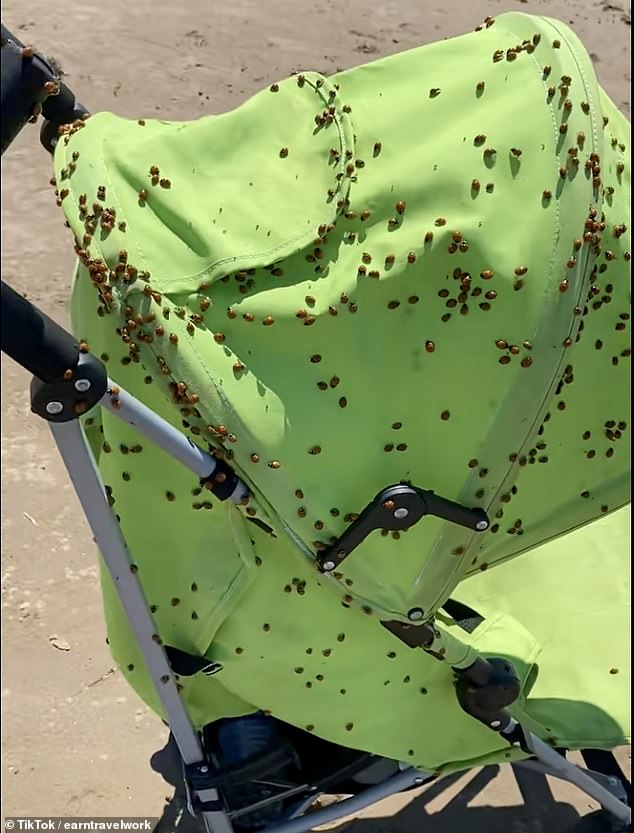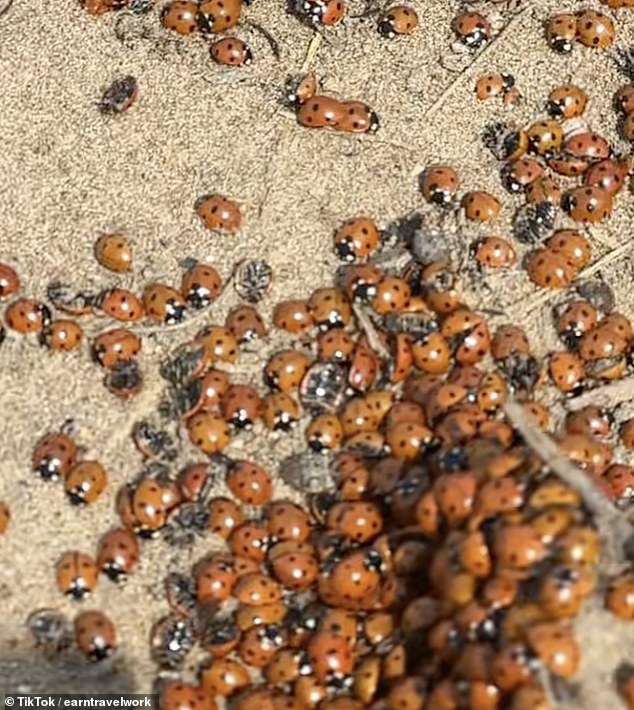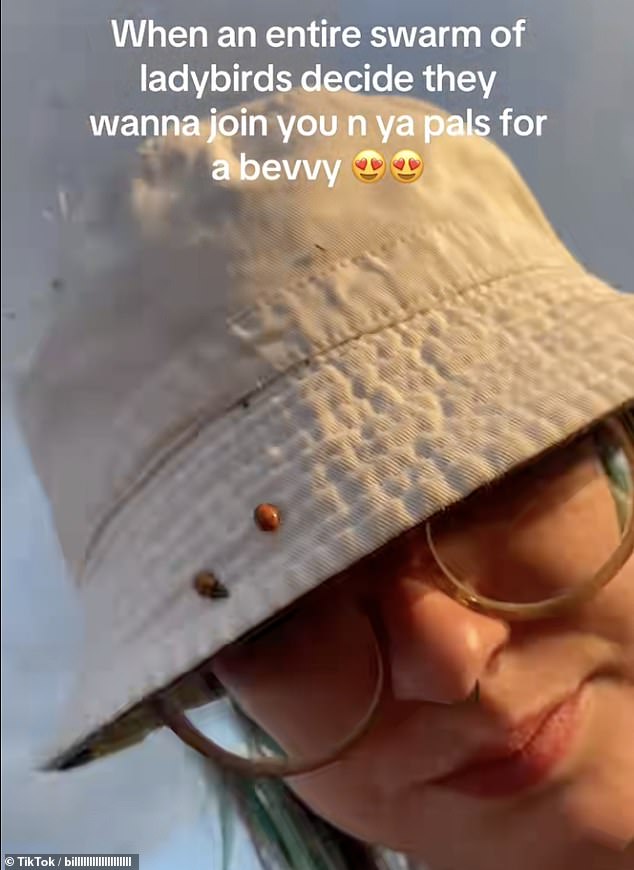Britons have been forced to take shelter in their cars as thousands of ladybirds descend on towns and cities across the country.
In seaside resorts like Weston-Super-Mare, beachgoers faced a ‘ladybird apocalypse’ as ‘millions’ of the insects covered every available surface.
On Thursday, a sudden swarm of beetles even brought about a temporary pause in play at the Lord’s test match against India.
Experts say this is the largest sighting since the famous ‘ladybird invasion’ of 1976.
Scientists say that these sudden swarms are due to the recent spell of hot weather, just like the exceptionally hot summer of 1976.
On TikTok, several users have shared videos of ladybird swarms descending on UK towns.
In one viral clip, a woman is covered in the swarming bugs as the caption reads: ‘Take this as your sign not to go to the beach today.’
Other posts show ladybirds crawling in their hundreds over prams, cars, umbrellas and even people’s food.

Baffled Britons have been forced to take shelter in cars and indoors as swarms of ladybirds descend on UK towns and cities.

A swarm of the flying beetles even brought about a temporary break in play at the Lord’s test match against India on Thursday after the insects were deemed too disruptive

In one video posted to TikTok, one visitor to the UK seaside wrote: ‘Take this as you sign not to go to the beach today and get swamped by ladybugs’
Professor Stuart Reynolds, an insect biologist from the University of Bath, told MailOnline: ‘Ecology is complicated and this is a multi-factor problem, but it’s for sure that the recent hot, dry weather has something to do with it.
‘My suggestion is that favourable weather conditions over the last few months have led to a boom in aphid numbers on crop land and woodland.
‘Ladybirds eat aphids, so this has led to a consequent boom in ladybirds.’
Although the sightings might seem alarming, Professor Reynolds claims there is ‘absolutely nothing to worry about.’
Professor Reynolds says: ‘It’s happened before and will happen again. Boom and bust cycles are common in nature.
‘Ladybirds may give you just a little nip sometimes – just to check whether you are edible or maybe because your skin is a bit salty – but they won’t do any damage.
‘It’s not a plague! Ladybirds are lovely and we should celebrate them! Everyone loves a ladybird!’
Over the last few weeks, Britain’s weather has been exceptionally warm, with temperatures peaking at 34.7°C (94.5°F) last Friday.

On TikTok, social media users have shared videos of the insects swarming over every available surface. The most affected areas appear to be seaside towns such as Weston-Super-Mare

Experts say that the sudden swarms are due to the recent warm weather, which has led to a boom in the numbers of aphids which ladybirds feed on
Like all insects, ladybirds and aphids speed up their life cycles during the warm weather, which means more insects are born.
However, the recent heatwaves have been so hot and dry that both vegetation and aphids have started to die off.
‘The last few weeks have been unfavourable to aphids, so that the poor ladybirds now have nothing to eat,’ says Professor Reynolds.
‘This leads them to fly off looking for grub elsewhere.’
In addition to food, the ladybirds are also coming together to find mates, which leads to even larger local swarms.
Although it might seem like it on social media, the insects probably aren’t deliberately making their way to the beach.
Professor Reynolds says that there are probably swarms ‘all over the place’, but they just happen to be more obvious in busy seaside towns like Weston-Super-Mare.
Despite their alarming appearance, the experts say that we should welcome the swarms with open arms.

Scientists say that we should welcome the arrival of so many insect predators, and suggest leaving out a shallow dish of water for them to drink from
Seeing so many ladybirds is a particularly good sign since they are a key predator as well as being a food source for larger animals like birds.
Professor Tim Coulson, science author and biologist at the University of Oxford, told MailOnline: ‘Predators, like ladybirds, are incredibly important components of ecosystems. Take away predators, and all hell breaks loose.
‘We should cherish our ladybirds! Definitely do not kill the ladybirds as they keep the numbers of pest species down. Much better to have ladybirds than to spray crops with insecticides to kill the aphids.’
Likewise, Professor Helen Roy, one of the world’s leading ladybird experts from the UK Centre for Ecology and Hydrology, told MailOnline: ‘Ladybirds are much-loved insects. So, I hope people can enjoy seeing so many ladybirds and celebrate these incredible insects.’
Ladybirds aren’t the only insects to have swarmed the UK amid the recent warm weather.
Britain has also faced a surge of wasps, an expert has warned.
Andrew Dellbridge of Ace Pest Control in Norfolk said the spring sunshine had lured wasps out of hibernation early, giving them more time to grow.
And though they’ll die off come winter, the head start means this year’s nests are already surpassing last year’s in size, with months still to go.
Now wasps are experiencing a ‘population explosion’, Mr Dellbridge said, and Britain faces a wave of jumbo nests before winter.
He said: ‘What I would expect to do in September–October as far as size of nest and multiple wasps within a nest, we’re getting now.
‘By September–October, the right back end of the season before they all die off, we should be in massive nest territory.’
